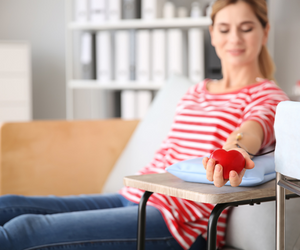Prepare for Your Blood Donation

Complete the information below:
tEven if you’ve donated blood many times before, it’s still a good idea to review the steps you should take before, during and after donating. If you follow these guidelines, you’ll have the best blood donation experience possible!
Before Your Donation
Eligibility and Appointments
First, make sure that you’re eligible to donate blood. It’s important to know that some donation programmes have their own set of requirements. One example is a donor must weigh at least 50 kg. This is because our blood volume is proportionate to our own body weight. For donor safety, individuals weighing less than 50 kg may not tolerate the removal of the required volume of blood as well as those who weigh more. So, if you’re new to donating, reach out to your local centre to learn about specific eligibility rules.
Next, book an appointment. Your time is valuable and we don’t want you to have to wait at our centre. Booking an appointment ensures that there will be staff on hand to process your donation in a timely manner. You can call +44 203 608 6260 or use our online appointment scheduling form.
What You Should and Shouldn't Eat
Certain foods and drinks can help you avoid common blood donation side-effects, like fatigue.
Here are some foods you SHOULD eat before donating blood:
- Iron-rich foods, such as meat, poultry, fish, shellfish, eggs and beans
- Vitamin C, which can be found in citrus fruits and juices, cantaloupe, mangos, pineapples, berries, watermelons and tomatoes
- Water or water-based hydration beverages
And here’s what you SHOULDN’T eat before donating:
- Fatty foods such as french fries or ice cream
- Iron blockers which include coffee and tea,
- High-calcium foods like milk, cheese and yogurt and chocolate
- Aspirin
- Alcohol
Get Your Rest
Sleeping for at least eight hours the night before you donate blood will help you recover quickly after your donation.
On the Day of Your Donation
Wear Comfortable Clothes
One of the “rookie mistakes” made by new donors is wearing a tight, long-sleeved shirt that is difficult to roll up. Instead, wear a loose, comfortable shirt, so the technician can easily access your arm.
Complete Your Paperwork
If it’s your first time visiting CTLS, you will be asked to fill out some forms about your medical history, medication use and other factors that could affect your donation.
A medical assistant or technician may also need to check your blood pressure and heart rate to make sure you’re healthy enough to donate blood.
Get Ready to Relax
A whole blood donation can take 15 minutes and a leukapheresis procedure can take from one to four hours. So, you may want to bring a book and/or some headphones. Tablets with movie options may be available to help the time pass.
After Donating
Right After Your Donation
After your donation is complete, you should eat! All of our centres offer a variety of snacks to replenish your fluid and sugar levels after donating blood.
For at least five hours after your donation, you should avoid strenuous physical activity and heavy lifting. Also, keep your bandage on and dry.
The Next Few Days
In the days after your blood donation, you may want to drink extra fluids and eat iron-rich foods, like meat, poultry, and fish. If you feel lightheaded, lie down with your feet up until the feeling passes. If you’re bleeding after removing your bandage, put pressure on your arm and raise it until the bleeding stops. You may also want to put an ice pack on your arm to help reduce the risk of bruising.
Now that you’re ready to donate blood, click here to book an appointment or contact us at +44 203 608 6260 to learn more.
Sources:
https://www.healthline.com/health/what-to-eat-before-donating-blood#side-effects
https://redcrosschat.org/2019/01/03/9-things-to-know-before-you-donate-blood-in-2019/
https://www.mayoclinic.org/tests-procedures/blood-donation/about/pac-20385144
.webp?width=2883&height=1011&name=CTLS%20Logo%C2%AE_%20Font_Final%20(2).webp)
